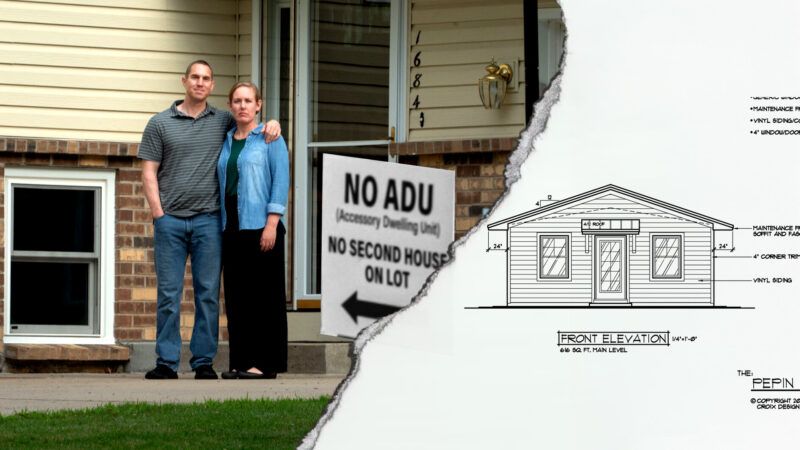Minnesota Town Denies Family Permission To Build Affordable Housing Unit on Their Property
The Pepin family is suing the City of Blaine after the City Council used dubious reasoning to deny a permit for additional housing on their property.

Like many cities in the United States, Blaine, Minnesota, is facing a housing shortage. In 2021, the city took steps to address this issue by passing Local Ordinance 21-2489, which permitted property owners in residential districts to construct an accessory dwelling unit (ADU)—a self-contained, mini-home—on their properties. While the ordinance was designed to bring more housing to Blaine, the City Council has yet to approve an ADU and recently denied an application to a local family who is looking to build an affordable housing unit on their property. The family is now suing the city.
In March, Blaine residents Alex and Lynda Pepin submitted their application for a conditional use permit (CUP) to build an ADU on their property, which would provide affordable housing for families struggling to get back on their feet. The detached ADU was expected to cost the Pepins between $130,000 and $140,000 and met the size and occupancy requirements set by the 2021 ordinance. The ADU application, which was the first to be submitted to the city since the ordinance passed, was approved by the city's Planning Commission in a 4–2 vote in April.
Despite the planning commission's vote, a staff report recommending approval, and code compliance, the Blaine City Council denied the Pepin family's permit to build an ADU in May, a decision the family is appealing with the Institute for Justice (I.J.). The denial followed a public forum where opponents voiced inaccurate concerns about the ADU's impact and character. Opponents claimed the Pepins would house "random/unknown people" who would be "in the [neighboring] park" "where children are constantly running around," and that the ADU would be a "horrible eye-sore." The meeting ran out of time before the Pepins were able to rebut the claims.
Matt Liles, a litigation fellow and attorney at I.J., tells Reason that the Pepins complied "not only in the letter of the law, but also in the spirit of the law with everything that Blaine requires for property owners who want to build an ADU." The ruling was "made up," he adds, and the Council had to "come up with some reason to deny it, because they couldn't rely on the law."
Councilmembers who voted against the ADU repeatedly referred to the original "intent" of the law as a reason for denial, relying on the second and fourth criteria, which require compatible zoning and relation to existing need for a CUP as justification. The Council also declined to provide formal reasons for the dubious denial, despite being required to do so under Minnesota law.
Liles criticizes such "inherently vague and nebulous" requirements, arguing that they grant excessive discretion to city officials and restrict property rights. The city's attorney, Tom Loonan, agrees with Liles; he reminded the Council during the meeting that the residential zoning code permits ADUs and that examining the intent of the ordinance is a "slippery slope" when existing laws are in place. Minnesota law prohibits the use of neighborhood opposition alone in denying CUPs and limits the role of the city officials to "evaluating how the CUP application meets the ordinance standards."
Still, councilmembers like Jess Robertson, Tom Newland, and Leslie Larson referenced vague criteria and unsubstantiated neighbor complaints about views, parking, and property values. Liles disputes the assessment, noting that duplexes and apartments exist nearby. He argues that an ADU won't ruin the neighborhood's residential character, contrary to the Council's implication.
Councilmembers Chris Ford and Terra Fleming voted to approve the ADU, with Ford noting he voted based on "what the law says," rather than relying on emotion or neighbor hearsay. Fleming also questioned colleagues' use of the zoning code to deny the permit, noting their absence during the passage of the 2021 ordinance and arguing that the ADU complied with the code.
Two weeks after they denied the Pepins' CUP application, the City Council established a one-year moratorium on any ADU applications, noting that "the Council discussed the intent of the accessory dwelling unit ordinance and determined the current regulations do not align with the original intent."
Despite the Planning Commission's vote to accept the Pepins' new ADU plans, which they labeled a "mother-in-law unit" in an attempt to challenge previous rejections, the City Council once again denied the proposal on Monday. This decision followed renewed objections from neighbors and the Pepins' refusal to accept conditions that would prohibit renting the ADU and require proof of their relation to the occupant upon request.
Now, the Pepins are moving forward with their lawsuit, which would have proceeded "even if the city had followed the law," Liles says.
The Pepins identified a legal solution to the housing problem in their community and addressed it. Instead of standing in their way, the City Council would better serve the city of Blaine by following suit.


Show Comments (19)